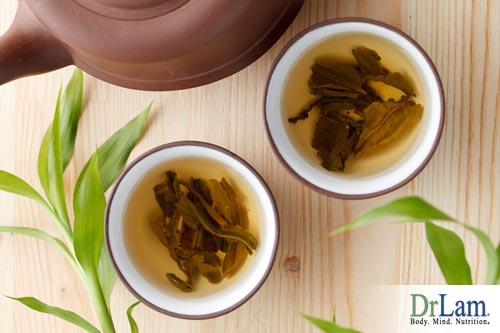 Have you ever wondered what the best tea for detox is? There is so much infromation flooding the media concerning the best tea for detox, it can be difficult to know what to choose. Tea's history is nearly 5,000 years old. Legend has it that it was discovered in 2737 B.C. by a Chinese emperor when some tea leaves accidentally blew into a pot of boiling water. In the 1600s tea became popular throughout Europe and the American colonies. In 1908, Thomas Sullivan of New York developed the concept of tea in a bag. This article looks at the benefits from various teas and what is the best tea for detox.
Have you ever wondered what the best tea for detox is? There is so much infromation flooding the media concerning the best tea for detox, it can be difficult to know what to choose. Tea's history is nearly 5,000 years old. Legend has it that it was discovered in 2737 B.C. by a Chinese emperor when some tea leaves accidentally blew into a pot of boiling water. In the 1600s tea became popular throughout Europe and the American colonies. In 1908, Thomas Sullivan of New York developed the concept of tea in a bag. This article looks at the benefits from various teas and what is the best tea for detox.
Tea can be broken down into 2 categories: non-herbal teas and herbal teas. This article will help you to determine which one is the best tea for detox. Non-herbal teas can be further broken down into three basic categories: black, green, and oolong. Black tea is the most popular, representing over 90 percent of the tea consumed in the U.S. Black tea has been fully oxidized or fermented and yields a hearty-flavored, amber brew. Some of the popular black teas include English Breakfast (a popular choice for breakfast due to its hearty flavor that mixes well with milk), Darjeeling (a blend of Himalayan teas with a flowery bouquet suited for lunch and snacks) and Orange Pekoe (a blend of Ceylon teas that is the most widely used of the tea blends).
Green tea, unlike black tea, is not oxidized. It has a more delicate taste and is light green/golden in color. Green tea, a staple in the Japan, is gaining popularity in the U.S. due in part to recent scientific studies linking green tea drinking with reduced cancer risk. This makes it the best tea for detox.
Oolong tea, popular in China, is partly oxidized and is a cross between black and green tea in color and taste.
All regular, non-herbal teas contain varying amounts of antioxidants and caffeine. They can offer up their benefits to be considered, also as a best tea for detox.
While flavored teas evolve from these three basic teas, herbal teas contain no true tea leaves; herbal and "medicinal" teas are created from the flowers, berries, peels, seeds, leaves, and roots of many different plants. Detoxification teas are special teas made of blends of herbs with special detoxification and cleansing properties. Herbal and detoxification teas normally do not contain any caffeine.
Tea is rich in antioxidant polyphenols (catechins, flavonols, theaflavins and thearubigins). These antioxidants are believed to be the active ingredients behind the beneficial effects of tea. Antioxidants help repair damage to cells and blood vessel walls from free radicals. They also help reduce blood clots, which could decrease the risk of a heart attack. Flavonoids are also found in varying amounts of fruits and vegetables as well.
While drinking non-herbal tea has been promoted for everything from curing cancer to reducing heart attack, scientific studies are not conclusive.
Experts at King's College, London studied 340 men and women who had suffered heart attacks and matched them by age, gender, and neighborhood residence with people who had no history of heart attack. They then compared the two groups' coffee and tea drinking habits for a year. The tea drinkers drank black tea as opposed to green tea (which contains fewer flavonoids) or herbal teas (which contain none).
Findings revealed that the tea drinkers' risk of a heart attack approached half of the non-tea drinkers. Scientists speculate that tea's beneficial cardio effects are due to the beverage's large amounts of flavonoids.
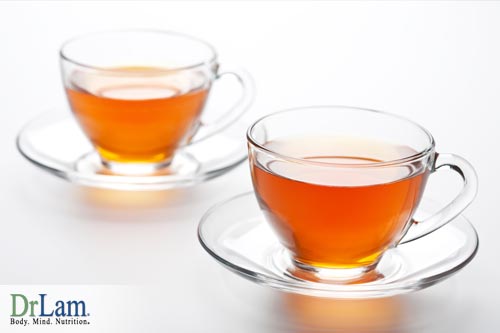 Two cups of tea also have the equivalent antioxidant activity of one and a half glasses of red wine, 12 glasses of white wine, seven glasses of orange juice, and 12 glasses of beer.
Two cups of tea also have the equivalent antioxidant activity of one and a half glasses of red wine, 12 glasses of white wine, seven glasses of orange juice, and 12 glasses of beer.
Tea consumption tended to reduce the development of aortic atherosclerosis in rabbits when studied in a laboratory setting. Tea polyphenols exert marked effects on cells, and inhibit neutrophil migration and inflammatory responses, sometimes at low concentrations. Other studies have shown no significant difference. Unfortunately epidemiological evidence relating regular consumption of tea or related polyphenols to cardiovascular heart disease is equivocal. Specifically, catechins are absorbed from tea, but low plasma concentrations are attained and whether such low plasma levels have therapeutic effect remains to be validated. Also, the bioavailability of the flavins and thearubigins is unknown at this time. Tea does not reduce blood pressure or plasma lipids in well-controlled human trials, although sporadic case reports have been positive. Tea polyphenols inhibit LDL lipid peroxidation in vitro, but the effect ex vivo is small.
The antioxidant content of various types of tea has been well studied. An analysis on 20 common brands of tea has shown that they contain widely varying amounts of antioxidants, which are known to help fight off cancer and heart disease among other illnesses.
The following teas were brewed for 3 minutes each and the antioxidant level is shown below:
| Brand of Tea | Catechin content (in milligrams) |
|---|---|
| Celestial Seasonings Green Tea | 217 |
| Lipton Green Tea | 201 |
| Bigelow Darjeeling Blend (black tea) | 164 |
| Uncle Lee's Green Tea | 157 |
| Stash Premium Green Tea Decaf | 53 |
| Twinings Earl Grey Black Tea | 46 |
| Bigelow Constant Comment (black tea) | 38 |
| Bigelow Constant Comment Decaf | 10 |
| Lipton Lemon Iced Tea | None |
| Snapple Peach Iced Tea | None |
The overwhelming majority of all tea consumed in the U.S. is black tea. The processing method of tea may account for some of the differences in antioxidant levels. Green tea is commonly thought to have more antioxidants than black tea. This was often, but not always the case. Most scientists that have really studied this have found that the number of antioxidants in black tea is actually higher than what is found in green tea.
Caffeine was first discovered in tea in 1827, and was named theine. It was later found in mate and various other plants. Eventually it was shown that the theine of tea was identical with the caffeine of coffee, and the term theine was then dropped.
Caffeine is the most widely used drug in the world today. Found in beverages like coffee, tea, and soft drinks, it is consumed by 8 out of 10 adults in the Western world today. Its toxic effect is without doubt.
In the study, a group of 10 healthy volunteers were given either inactive placebo capsules or capsules containing 100 milligrams of caffeine - a quantity equivalent to one cup of coffee or 2-3 cups of tea. The volunteers were then given the opposite capsule from the previous dosage on another day. The results showed that caffeine consumption caused an increase in wave reflection - a measure of arterial stiffness - for at least 2 hours.
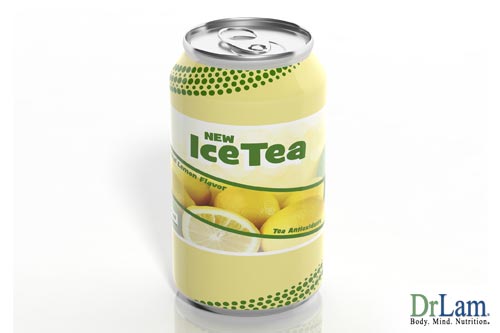 Just one cup of coffee or two cups of tea is enough to harden a person's arteries for several hours afterwards. This puts extra pressure on the heart, thus increasing the risk of heart attack or stroke. The same amount of caffeine can raise the blood pressure by 5 to 10 millimeters of mercury. If this increase is on a regular basis, it could have negative repercussions on a person's long-term prognosis.
Just one cup of coffee or two cups of tea is enough to harden a person's arteries for several hours afterwards. This puts extra pressure on the heart, thus increasing the risk of heart attack or stroke. The same amount of caffeine can raise the blood pressure by 5 to 10 millimeters of mercury. If this increase is on a regular basis, it could have negative repercussions on a person's long-term prognosis.
It is evident today that many of our cancers are related to a dominance of estrogen. In a world flooded with estrogen and estrogen-like compounds, it is important for our body to have as low an estrogen load as possible. Studies have shown that drinking more than two cups of coffee a day may increase estrogen levels in women. It could also lead to problems such as endometriosis and breast pain.
Having high levels of estrogen for women in such cases can be detrimental as it can lead to breast cancer in women and prostate cancer in men. Those who have a family history of cancer also have a higher risk.
In a clinical trial conducted, about 500 women between the ages of 36 to 45 were studied. These women were not pregnant, not breast-feeding or having hormonal treatment. They were interviewed regarding their diets, smoking habits, height, and weight. Their hormone levels during the first five days of their menstrual cycle was also measured.
The results showed that women who consumed more than one cup of coffee (or two cups of tea) a day had significantly higher levels of estrogen during the early follicular phase of their menstrual cycle. Those who consumed at least 500 mg of caffeine daily, the equivalent of four or five cups of coffee (or 10 cups of tea in caffeine equivalent) had nearly 70% more estrogen than women who consumed less than 100 mg of caffeine daily.
Caffeine intake from all sources was associated with higher estrogen levels regardless of the women's age, body mass index (BMI), caloric intake, smoking habits, alcohol and cholesterol intake. Caffeine consumption increases estradiol levels. There are three different forms of estrogen in the body - estrone, estradiol, and estriol. Estradiol is the form that is pro-cancerous. Women should limit their intake of coffee to not more than one to two cups daily to decrease their risk of having more serious health problems.
Chronic high caffeine intake can also lead to adrenal gland exhaustion and the reduction in production of progesterone. The proper progesterone to estrogen ratio is therefore not maintained, resulting in further estrogen dominance.
In summary, chronic long-term caffeine consumption from non-herbal teas can lead to increased cardiac stimulation, estrogen dominance, and adrenal gland exhaustion.
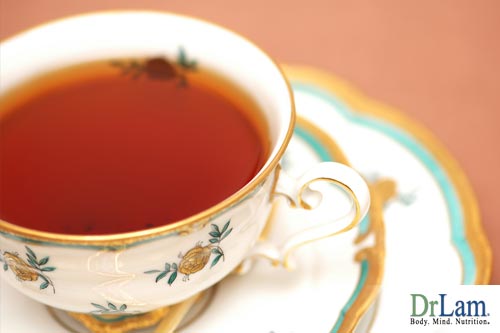 Other than herbal teas such as chamomile tea, all non-herbal teas contain caffeine, though less than coffee.
Other than herbal teas such as chamomile tea, all non-herbal teas contain caffeine, though less than coffee.
The amounts of caffeine in any single serving of these beverages vary significantly. The amount of caffeine in coffee or tea depends on a number of factors, including the variety of coffee bean or tea leaf, where it is grown, particle size used, (the particular coffee "grind" or tea leaf cut), and the method and length of brewing or steeping. Also with tea, studies show that leaf location on the tea plant affects content of caffeine in that leaf.
On the average, coffee contains the most caffeine, and tea provides only 1/2 to 1/3 as much. One of the more confusing aspects of caffeine content is the fact that coffee contains less caffeine than tea when measured in its dry form. The caffeine content of a prepared cup of coffee is significantly higher than the caffeine content of a prepared cup of tea.
The length of the infusion in water also affects caffeine content. Black tea infused for 5 minutes yields 40-100 milligrams, whereas a 3-minute infusion produces 20-40 milligrams, or half as much.
The following is the approximate caffeine content of various beverages
| Item | Average per serving (Milligrams of Caffeine) | Range (Milligrams of Caffeine) |
|---|---|---|
| Coffee (5 oz. cup) | 90 | 40-170 |
| Cola (12 oz. can) | 45 | 30-60 |
| Black Tea (one tea bag) | 40 | 25-110 |
| Oolong Tea (one tea bag in 8 oz) | 30 | 15-55 |
| Green Tea (one tea bag in 8 oz) | 20 | 10-30 |
| Decaf Coffee | 5 | 3-10 |
| Decaf Tea (one tea bag in 8 oz) | 2 | 1-4 |
| Herbal Tea (one tea bag in 8 oz) | None | N/A |
Decaffeinated tea may be the way to go if you have to drink non-herbal teas. There are 2 common ways to decaffeinate tea, the more common one utilizing a chemical called ethyl acetate. This process, however, also diminishes the healthy effects of the tea by eliminating up to 70% of the polyphenols found in the tea. The other method of decaffeinating is by using carbon dioxide and water. This will retain about 95% of the healthy substances.
Caffeine tolerance varies greatly among individuals. Any natural compound, when taken in excess, can be toxic. Studies have shown a possibility that caffeine can interfere with fetal development, including lowering birth weight and contributing to skeletal and other abnormalities. Until they reach the age of seven or eight months, babies cannot get rid of caffeine metabolites, and traces of caffeine can appear in breast milk as well. Pregnant or nursing mothers should refrain from any caffeinated beverage, including tea (other than herbal tea).
For normal adults, your body will tell you if you listen carefully. Some people find it hard to fall asleep after drinking tea. Others may have palpitations or fast heart rate. Others may have sweaty palms. The individual reaction may vary. The stimulatory effect of tea can last for up to 36 hours in highly sensitive individuals, although the norm is somewhere between 2-8 hours.
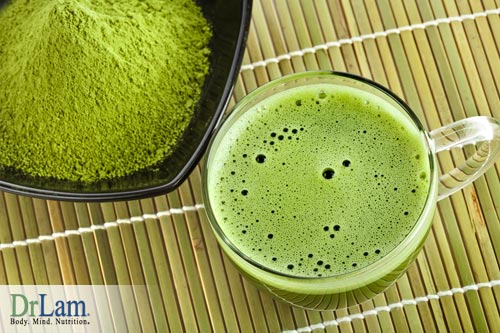 Hundreds of research studies over the past decade show health enhancing effects of green tea - from cancer prevention to reduction in blood pressure. Widespread marketing and promotional campaigns have made green tea a household word. Key ingredients for these benefits appear to be the polyphenols found in green tea that have strong antioxidant properties.
Hundreds of research studies over the past decade show health enhancing effects of green tea - from cancer prevention to reduction in blood pressure. Widespread marketing and promotional campaigns have made green tea a household word. Key ingredients for these benefits appear to be the polyphenols found in green tea that have strong antioxidant properties.
A USDA study found that the antioxidant strength of green tea experts at the University of Kansas have proclaimed that green tea is equal to 100 times of the antioxidant strength of Vitamin C and 25 times that of Vitamin E. The USDA Human Nutrition Research Center on Aging discovered that one cup of green tea brewed for up to three to five minutes contains about the same amount of antioxidants as one serving of vegetables.
The antioxidants in green tea help prevent or delay damage to body cells and tissues. They also reduce the risk of heart attack and protect blood vessels that feed the heart and brain. Green tea also appears to speed up calorie burning including fat-calorie burning.
Green tea could prevent cancer due to its special ingredient, epigallocatechin gallate, which is found mainly in (670 g/kg) green tea extract, in addition to the catechins with antioxidant properties. To explore this claim, scientists treated cells grown with or without green tea extract with iron as an oxidative stimulus for two hours. Supplementation with green tea extract significantly decreased malondialdehyde production and DNA damage after iron oxidative treatment. Malondialdehyde is a lipid peroxidative product, which is believed to be a marker of radical generation and tissue damage. There was no effect on membrane distribution of n-3 fatty acids due to iron treatment in cells that were not treated with green tea
Research has revealed that nearly all tea components strongly inhibit adduct formation with human DNA, as well as artificially induced free radicals. Beneficial enzyme such as glutathione-S-transferase is enhanced by nearly all tea components.
The main components of Green tea (hot aqueous, polyphenols, epicatechin, epicatechin gallate, epigallocatechin gallate) and black tea extracts (hot aqueous, polyphenols, and theaflavins) have also been shown to strongly inhibit tumor transformation in rodent breast tissue cultures and epithelial cells as well as human lung epithelial cells in laboratory studies. Ornithine decarboxylase activity (involved in the synthesis of urea, an end product of protein metabolism) was suppressed by nearly all the green tea extracts, but not from black tea. Hence the results show that black and green tea extracts helped reduce genetic mutation, anti-proliferation, and anti-cancer incidences.
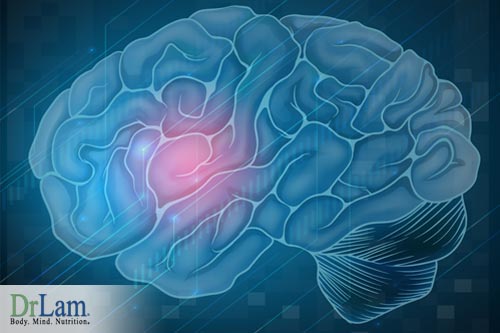 Chemicals found in green tea and other plants may prevent the brain damage that occurs after strokes and other brain injuries, say researchers from the University of California, San Francisco (UCSF). Researchers tested the effects in the laboratory of two plant-derived chemicals on brain cells under stress - Gallotannin and Nobotanin B. Gallotannin is found in green tea and other plants. Nobotanin B, a similar chemical, comes from the Brazilian glory bush. Both chemicals block PARG activity. Both gallotannin and nobotanin B also block brain cell death from chemicals that normally overly stimulate the cells.
Chemicals found in green tea and other plants may prevent the brain damage that occurs after strokes and other brain injuries, say researchers from the University of California, San Francisco (UCSF). Researchers tested the effects in the laboratory of two plant-derived chemicals on brain cells under stress - Gallotannin and Nobotanin B. Gallotannin is found in green tea and other plants. Nobotanin B, a similar chemical, comes from the Brazilian glory bush. Both chemicals block PARG activity. Both gallotannin and nobotanin B also block brain cell death from chemicals that normally overly stimulate the cells.
The PARP/PARG system is activated by the release of cell-damaging oxygen radicals, a phenomenon called oxidative stress, and when cells become overexcited by various toxins. Blockers of PARP activity have already been used to prevent brain cell death but as PARG blockers, gallotannin and nobotanin B were 10 to 1,000 times more potent in preventing brain cell death caused by oxygen radicals. Gallotannin was 100 times more effective than antioxidants, which are chemicals that can soak up the toxic oxygen molecules.
While numerous studies continue to show green tea's anti carcinogenic effect, intake of more than 1 cup a day is not warranted because there are simply many better ways to get the antioxidant from sources other than green tea. For example, Vitamin C and E are strong antioxidants that can be easily obtained from whole fruits and vegetables. Green tea is the best of all non-herbal tea. Unfortunately, it also contains caffeine and there is no apparent escape from this toxin. Caffeine is a stimulant and is not recommended for those with cardiovascular disease, adrenal compromised conditions.
It is unlikely that moderate consumption of green tea (one cup a day) will have any negative effects if the body is in optimum condition. Over indulgence should be avoided.
Herbs are found mainly in the form of teas, powders, or extracts. Herbal teas can be made and consumed readily throughout the day, as they are mild and gentle. In contrast to non-herbal tea such as black or green tea, they contain no caffeine and are excellent detoxification tools and digestive aids. Herbal ingredients and commonly used ingredients that enhance intestinal motility include: senna leaf, peppermint leaf, stevia leaf, buckthorn bark, damiana leaf, RED peel, chamomile flower, and uva ursi leaf.
This is a special group herbal teas that uses a blend of herbal tea and natural compounds that help with the digestive system, promote bowel movement, enhance weight loss, and detoxify and cleanse the body. They are available in tea bags or raw tea that can be brewed.
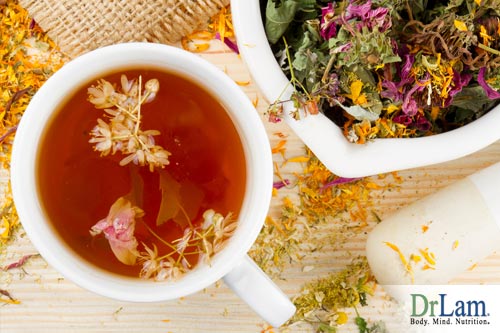 Detox teas are best taken after the evening meal. (It is always good to eat your regular meal fortified with digestive enzymes to enhance breakdown of food in the gastro intestinal tract as a routine practice). In locating the best tea for detox, bear in mind that detox teas usually have a laxative effect. Start slowly if you are new to detox teas. You should begin by steeping the tea just 2 minutes (in 1-2 cups of water) for the first 3-5 days. As your system adjusts, you may increase steeping to 5 minutes. Most individuals will experience increased bowel movements or slight cramping sensation during the first few days. This is due to the initial cleansing of the body system and is normal.
Detox teas are best taken after the evening meal. (It is always good to eat your regular meal fortified with digestive enzymes to enhance breakdown of food in the gastro intestinal tract as a routine practice). In locating the best tea for detox, bear in mind that detox teas usually have a laxative effect. Start slowly if you are new to detox teas. You should begin by steeping the tea just 2 minutes (in 1-2 cups of water) for the first 3-5 days. As your system adjusts, you may increase steeping to 5 minutes. Most individuals will experience increased bowel movements or slight cramping sensation during the first few days. This is due to the initial cleansing of the body system and is normal.
The best tea for detox will help produce a good bowel movement that is soft, smooth, and easy to pass, but not watery. It is not uncommon, however, to have experience of watery stool, especially during the initial cleansing process. If you experience diarrhea or cramps, simply reduce intake or steeping time.
It should be noted that the consistency of the bowel movement varies greatly depending on the person. Adjust the amount of herbal tea you need to achieve the desired result. Suffice to say that the bowel movement should not be too watery on an on going basis, which can lead to dehydration and electrolyte imbalance if one is not careful. It is always a good habit to drink more water than normal during a detoxification and cleansing state.
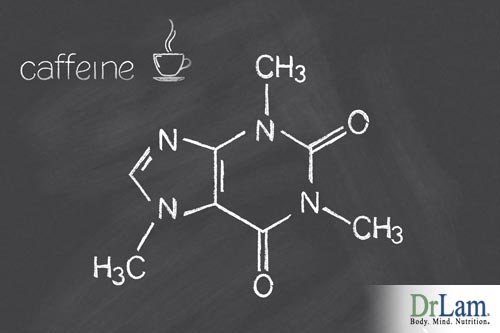 So, in determining what tea is best tea for detox for you consider the above and keep in mind the following. Tea comes in many varieties. Common teas such as black tea contains little antioxidant and about 1/3 the amount of caffeine compare to coffee. Green tea has about 1/5 to 1/3 the caffeine content, but contain a good amount of antioxidants. Decaffeinated teas also contain caffeine, although much less than regular tea and also less than decaffeinated coffees. Caffeine is a known stimulant and a pro-aging compound. The negative effect of caffeine in tea outweighs any health benefits. While researchers continue to point to the cancer prevention effect of tea, we continue to caution the fact that for cancer prevention, there are better ways to get antioxidants that through tea. Tea contains caffeine, which we all know are potent stimulants which can, and do, upset the autonomous nervous system. For anti-cancer properties of tea, you should consider taking antioxidants from whole foods and supplement with nutritional factors like grape seed extract. There are many other ways to obtain antioxidants other than from non-herbal tea. So, a caffine free tea is considered the best tea for detox. Herbal teas are an exception to other teas because there is no caffeine at all in herbal teas, however, they also do not contain the same level of antioxidants. Detox herbal teas should be taken regularly to detoxify and tonify the body. The way to get the most out of using herbal teas, as they are the least stimulating and thus the best tea for detox, is to utilize them consistently and with discipline so as the reap the most out of their benefits, while powerful and effective, come in low doses.
So, in determining what tea is best tea for detox for you consider the above and keep in mind the following. Tea comes in many varieties. Common teas such as black tea contains little antioxidant and about 1/3 the amount of caffeine compare to coffee. Green tea has about 1/5 to 1/3 the caffeine content, but contain a good amount of antioxidants. Decaffeinated teas also contain caffeine, although much less than regular tea and also less than decaffeinated coffees. Caffeine is a known stimulant and a pro-aging compound. The negative effect of caffeine in tea outweighs any health benefits. While researchers continue to point to the cancer prevention effect of tea, we continue to caution the fact that for cancer prevention, there are better ways to get antioxidants that through tea. Tea contains caffeine, which we all know are potent stimulants which can, and do, upset the autonomous nervous system. For anti-cancer properties of tea, you should consider taking antioxidants from whole foods and supplement with nutritional factors like grape seed extract. There are many other ways to obtain antioxidants other than from non-herbal tea. So, a caffine free tea is considered the best tea for detox. Herbal teas are an exception to other teas because there is no caffeine at all in herbal teas, however, they also do not contain the same level of antioxidants. Detox herbal teas should be taken regularly to detoxify and tonify the body. The way to get the most out of using herbal teas, as they are the least stimulating and thus the best tea for detox, is to utilize them consistently and with discipline so as the reap the most out of their benefits, while powerful and effective, come in low doses.
Anyone with high blood pressure or a weak cardiovascular system should avoid caffeine, which rules out both green and black tea. The best tea for detox are not the ones with caffine. Other than herbal teas and herbal detox teas, both of which contain no caffeine, the only other liquid to be consumed is pure filtered water. Another option, however, is to purchase the decaffeinated varieties of tea and incorporate those as the best tea for detox of the body. Even so, it is to be noted that even decaf tea contains up to 2.5% of caffeine, about half of what can be found in regular tea. An alternative to that is herbal tea, which contains no caffeine, as the best tea for detox is caffine free.
